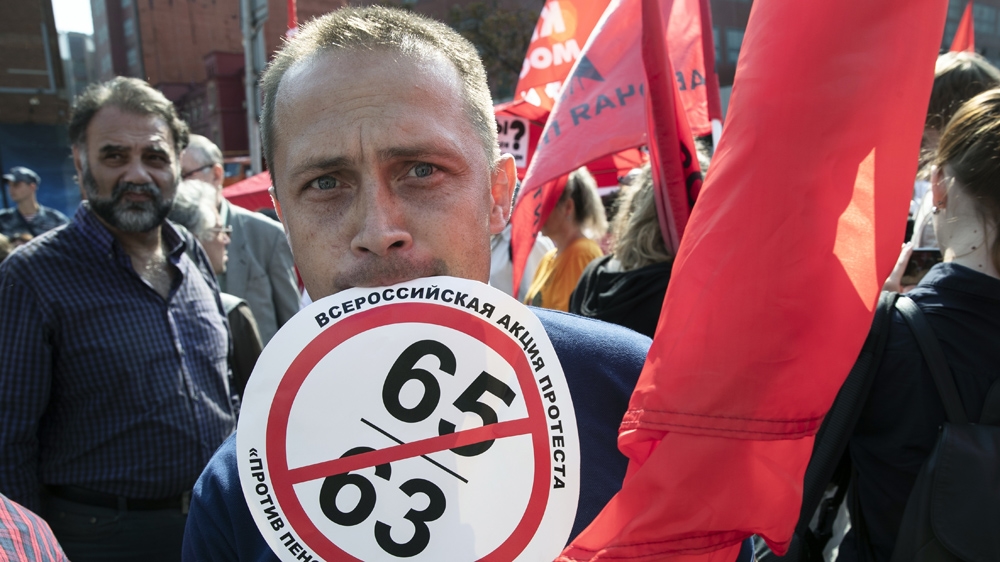Thousands protest against pension law despite Putin’s rollback
Thousands of Russians have joined protests against plans to raise the retirement age, despite a recent move by President Vladimir Putin to soften the deeply unpopular measure.
Large crowds on Sunday gathered close to the Kremlin in the capital, Moscow, with many demonstrators carrying the red flags and banners of the opposition KPRF Communist Party, the main organiser of the rally.
Around 9,000 people took to the streets, according to White Counter, an NGO that counts participants at rallies. Moscow police put the number of participants at 6,000.
A large banner reading “We do not trust United Russia”, was held up by protesters and featured a drawing of a red fist punching the white polar bear logo of Putin’s ruling party, according to Reuters news agency.
“Today we are holding an all-Russia protest against this cannibalistic reform,” Gennady Zyuganov, leader of the Communist Party, told protesters.
A separate Moscow gathering, organised by the Just Russia party, drew some 1,500 people, police said. Protests also took place in other Russian cities, including Siberia’s Novosibirsk and Vladivostok.
They were the latest in a series of demonstrations against the government proposal, announced in June, to gradually raise the pension age from 60 to 65 for men and from 55 to 63 for women in a change that would also affect the age at which Russians can receive state retirement pensions.
Following the public outcry, Putin took personal responsibility for the reform for the first time in a televised address on Wednesday, describing it as a financial necessity and asking Russians for their understanding.
During his speech, Putin offered to lower the proposed retirement age for women from 63 to 60, women currently retire at 55.
The proposed raise for men would remain unchanged.
The measure is intended to address workplace shortages and boost the economy. However, unions and activists have raised concerns that, should the proposal be accepted, many Russians may not live long enough to claim a state pension.
According to the World Health Organization, Russian men have an average life expectancy of 66 years, while for women the figure is 77.
Critics say in some regions, the new retirement age would exceed life expectancy.
Putin’s approval rating has fallen by around 10 percentage points since the proposed reforms were announced, according to the Levada Center, an independent Moscow-based polling organisation, although it still stands at around 70 percent.
 |
| Critics of the proposal say in some regions, the new retirement age would exceed life expectancy [Pavel Golovkin/The Associated Press] |
‘Whoever stays at home enables the thieves’
Anna Borschevskaya, a fellow at The Washington Institute focusing on Russia’s foreign and domestic policy, told Al Jazeera that, despite the concession, many Russians feel Putin is to blame for the proposals.
“He presented himself as this fatherly figure who is stepping in at the last minute to intervene to save everyone, but ultimately the public holds him responsible,” she said.
“These reforms demonstrate Russia’s economic decline and the government’s inability to handle development because Russia is a system that is not geared towards development of the country … For example, the government had stopped contributing to the pension fund to finance the Crimea annexation, so it’s prioritising political motives, funding foreign adventures over domestic development.”
The economy has been suffering for several years, burdened by sanctions imposed after Russia annexed Crimea in 2014 and a drop in oil prices.
In late August, Russian opposition leader Alexei Navalny, a key figure in arranging Sunday’s protests, was arrested in Moscow.
Navalny’s spokesperson linked his detainment to his call for protests against the pension reform.
“I don’t doubt that you will be able to do it without me. The protest will be held in almost 100 cities in the country, you must join,” the opposition politician said in an Instagram post from detention last week.
“Swindlers and thieves will not quit by themselves and no one except for us can defend our pensions and our present and future. Whoever stays at home enables the thieves,” he said.
Almost three million people have signed an online petition against the reform, which has been described by Moskovski Komsomolets, a Moscow newspaper, as “the most dangerous and risky reform” of Putin’s rule.
In March, Putin won a landslide re-election victory, extending his rule for another six years. The 65-year-old has been in power, either as president or prime minister, since 2000.




